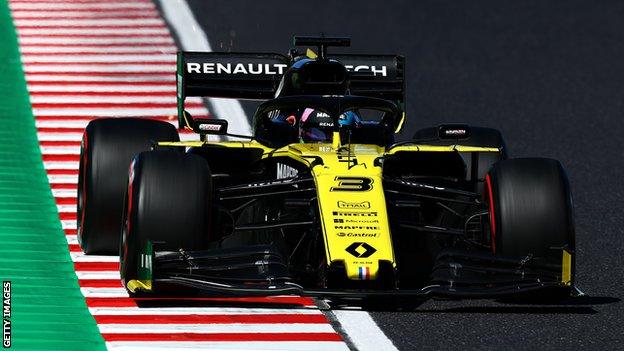Renault critical of Japanese GP disqualification
- Published

Daniel Ricciardo finished sixth in Japan and team-mate Nico Hulkenberg was 10th
Renault have criticised their Japanese Grand Prix disqualification as "not proportionate" and "inconsistent".
But the team will not appeal against the penalty for using a driver-aid system to avoid "investing further time and effort in a sterile debate".
Renault's brake-bias adjustment system contravened rules dictating that the car must be driven alone and unaided.
The team said the penalty was "not proportionate to any benefit the drivers derived".
They added that the decision was "subjective" - but that they were not appealing because they had "no new evidence" to add to the case.
Renault had until 16:00 BST on Thursday to decide whether to appeal against the disqualification of Daniel Ricciardo and Nico Hulkenberg from sixth and 10th places at the race at Suzuka on 13 October.
Renault's statement referenced the contradiction in the ruling by FIA, which said that the system complied with the technical regulations by "exploiting certain ambiguities" within them but contravened sporting regulations outlawing driver aids.
The ruling, external hinged on the details of what officials described as "innovative solutions" to adjusting the brake bias - the balance of braking from front to rear - around a lap.
Renault said they believed their disqualification from the race result was "inconsistent with previous sanctions for similar breaches".
It added: "However, since we have no new evidence to bring other than that already produced to demonstrate the legality of our system, we do not wish to invest further time and effort in a sterile debate in front of the International Court of Appeal concerning the subjective appreciation, and therefore sanction, related to an aid that reduces the driver workload without enhancing the performance of the car.
"Formula 1 will always be an arena for the relentless search for the slightest possible opportunities for competitive advantage. It is what we have always done and will continue to do, albeit with stronger internal processes before innovative solutions are brought on track."
The ruling was made on the grounds that Renault's brake-bias adjustment system "acts as a driver aid by saving the driver from having to make a number of adjustments during a lap".
Brake bias is changed by drivers using controls on the steering wheel.
Details of the operation of the system were not included in the ruling because it contained Renault's intellectual property and should remain "confidential in nature because (the stewards) evaluate data worthy of protection".